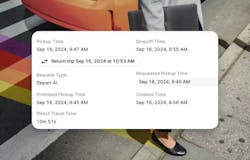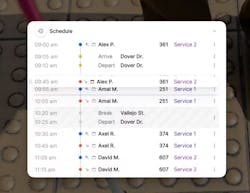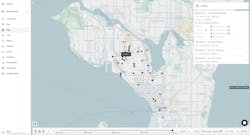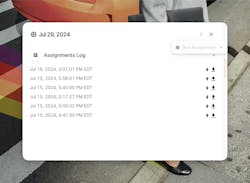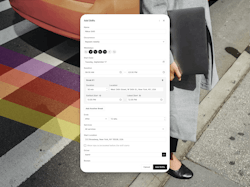The Routing Company launches new on-demand transit service in partnership with VCU Health, updates Pingo products
The Routing Company (TRC) is partnering with the Virginia Commonwealth University Health System Authority (VCU Health) to launch a new dedicated on-demand transit service to support its community of employees, students and patients.
Virginia Commonwealth University (VCU) is a major public university located in Richmond, Va., with more than 28,000 students. TRC first partnered with VCU in 2022 to significantly increase transit efficiency through one platform, delivering both on-demand and fixed route service. With the launch, TRC expands its footprint with VCU to also support its health network.
TRC notes VCU Health is responsible for the clinical activities of VCU Health hospitals and clinics. As a leading academic medical center, VCU Health serves as a hub for critical healthcare services, research and education. The new transit service provides a reliable and accessible on-demand transit option for employees working late shifts, as well as patients and their families needing to travel between hospital facilities or access other campus resources.
The service, which shifted away from dial-in trip bookings to on-demand service powered by Pingo™, launched in July and completed more than 500 trips in its first month.
"We are thrilled to introduce this innovative transit solution to VCU Health," said James Cox, CEO, TRC. "By leveraging our advanced Pingo technology and on-demand transit expertise, we are able to deliver a seamless and convenient transportation experience that supports VCU Health's commitment to providing exceptional care. Through this partnership, we are expanding our on-demand transit footprint with VCU, which today has delivered more than 800,000 rides – illustrating our continued market traction and growth.”
The service operates seven days a week from 5:00 pm until 8:00 am, with designated pick-up locations across the VCU Health campus. Riders can easily book trip requests through the TRC Ride Pingo™ app.
Updates to Pingo products
On Sept. 18, TRC updated its Pingo Access™ product with nine new features, designed to significantly elevate the experience for dispatchers and call center reservationists.
With features such as round-trip bookings, rider saved addresses, quiet hours and dispatch-to-driver communication, TRC says the upgrades deliver tangible benefits that simplify complex processes, streamline operations and improve the quality of service for paratransit systems.
"We’re pushing the boundaries of what transit technology can do, particularly in how we create meaningful experiences for all users," Cox said. Paratransit is one of the most complex and critical elements of public transit and we’re committed to ensuring that the user experience for riders, reservationists and dispatchers is nothing short of exceptional. As we continue to invest in our platform, we’re excited about the role we play in improving the quality of life for communities that depend on accessible and equitable transit."
Empowering reservationists: Six user-centric features
TRC notes the latest enhancements focus on reducing friction and increasing convenience for call center reservationists. Highlights include:
- Smart round trips: Simplifying round-trip bookings to just two clicks, enabling faster scheduling for busy agents.
- Rider saved addresses: Agents can now save commonly used addresses and access them with a single click during the booking process, improving booking speed and accuracy.
- Saved notification preferences: Riders can store their preferred notification methods, reducing manual data entry for agents.
- Quiet hours: A feature to mute non-urgent notifications during designated hours, optimizing productivity and rider experience.
- Custom subscriptions: Riders can pre-schedule recurring trips, freeing up call center agents from handling repetitive booking requests.
- Persistent driver notes: Easily accessible notes allow drivers to understand riders’ needs on every trip, ensuring personalized service.
Redefining the dispatcher experience
In tandem, TRC says the remaining three upgrades deliver critical enhancements for dispatchers, addressing the complex needs of modern transit systems:
- Instant service alerts: Real-time notifications sent through the Ride Pingo™ app keep riders informed of service disruptions, leveraging the latest in GTFS Service Alerts.
- Priority pickup reordering: More than just reassigning trips, dispatchers can now customize the order of pick-ups and drop-offs on a manifest. The custom orders are preserved even when the global optimizer kicks in.
- Dispatch-to-driver communication: A two-way communication tool that allows dispatchers and drivers to seamlessly share texts, images and voice notes, making coordination faster and more effective.
"Our team has spent months collaborating with our agency partners and listening to real-time user feedback," said Niko Rekhviashvili, senior director of product, TRC. "These updates reflect our deep commitment to solving real-world challenges, making the lives of transit operators and reservationists easier and ultimately driving greater efficiency across the board. At TRC, innovation is continuous because we recognize that every feature improvement can have a direct impact on service quality, operational savings and most importantly, the rider experience.”
"TRC continuously listens to its customers and implements changes that matter – and what’s remarkable is that they manage to deploy these updates without any downtime or operational lag," said Diane Feinstein, transportation manager of FAST. "The seamless integration of multiple transit modes under Pingo is a game-changer, making our service more inclusive and efficient. Our riders feel empowered, not marginalized, and that's a huge leap forward in accessible transit."
On Sept. 25, TRC also launched a new wave of upgrades to its Pingo Access paratransit product. The upgrades are designed to enhance the functionality of Pingo for schedulers, dispatchers and operators, delivering greater efficiency and flexibility in paratransit scheduling and operations.
Key features include TRC’s new Next-Generation Simulation Agents, Async Assigner and Recurring Shift Management – powerful tools that simplify complex scheduling tasks and streamline day-to-day operations.
“Many paratransit agencies still rely on manual systems while others use fully automated solutions that take away much-needed control – and both approaches leave a lot of room for improvement,” Rekhviashvili said. “Our goal is to offer tools that go beyond a one-size-fits-all approach, ultimately empowering transit professionals with the latest technology and best practices to enhance their operations in the most user-friendly way possible.”
New features
- Next-Generation Simulation Agents: The agents allow agencies to simulate complex scenarios, including a mix of on-demand and pre-scheduled trips, flex routes and more, giving schedulers a risk-free environment to test new features and optimize their operations.
- Async Assigner: The newly enhanced Async Assigner brings powerful automation to pre-scheduled rides. Operators can manually or automatically trigger the Assigner, which intelligently reorganizes ride assignments while respecting any manual reassignments, reorders or locked trips made by human dispatchers. With the new Async Assigner, TRC has routinely observed a 30 percent increase in fleet productivity metrics.
- Recurring Shift Management: Provides dispatchers with long-term planning tools to manage shifts, set up flex routes and schedule driver breaks, all while offering easy-to-use editing capabilities – even for shifts with assigned trips.
“We’ve appreciated TRC’s spirit of partnership, adapting their product to our local needs and innovating a smart trip-planning tool that incorporates fixed-route with on-demand services,” said John Clauson, executive director, Kitsap Transit.
“Innovation is in our DNA,” Cox said. “With each new upgrade, we’re delivering not just features, but solutions that empower transit agencies and improve the lives of riders. Our commitment to customer experience remains unmatched, as shown by our industry-leading NPS of 92. We're focused on building tools that solve real-world challenges while continuously enhancing the user experience."
About the Author
Brandon Lewis
Associate Editor
Brandon Lewis is a recent graduate of Kent State University with a bachelor’s degree in journalism. Lewis is a former freelance editorial assistant at Vehicle Service Pros in Endeavor Business Media’s Vehicle Repair Group. Lewis brings his knowledge of web managing, copyediting and SEO practices to Mass Transit magazine as an associate editor. He is also a co-host of the Infrastructure Technology Podcast.

